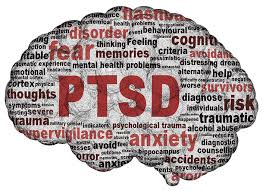
Everyone deals with stress at some point in their life, from parenting and family to career or coworker problems:
Sometimes, though, the stress comes from something deeper like a traumatic event. In this case, a person may feel extreme sadness, guilt, or fear, and he may have a difficult time with these emotions, even reliving the traumatic event.
If you’re experiencing these uncontrollable emotions and memories, you may be suffering from post-traumatic stress disorder, and you’re not alone.
Are You Suffering From PTSD?
According to the National Center for PTSD, nearly 8 percent of Americans will go through post-traumatic stress disorder at some point in their lives. Women suffer from the disorder more often than men, and veterans who have served in combat are 2–3 times more likely to get the disorder than the average citizen.
PTSD has several tell-tale symptoms, but you might not recognize them yourself at first. If you’re going through PTSD, you may find those bad or unwelcome memories of the event keep intruding on your thoughts. In addition, you might feel an extreme fear of life-threatening dangers or general anxiety in your life.
Many people with PTSD also relive the event through flashbacks or nightmares. While people who experience trauma may go through some of these symptoms, those with PTSD experience them to such an extent that the symptoms affect their everyday lives.
The following is a more comprehensive list of symptoms:
- Extreme anxiety or fear
- Recurring bad memories, flashbacks, or nightmares
- Emotional distress over reminders of the event
- Avoidance of the event, reminders, or conversation
- Negative thoughts, guilt, or blame over the event
- Memory problems, including key aspects of the trauma
- Difficulty Sleeping
Does Marriage Save Your Brain?
Getting Help For PTSD
While you might feel hopeless about your emotional state and the event itself, there is a treatment that will help you return to normal life again. First, you should see a doctor about getting treatment for your symptoms.
During this visit, you may want to bring a friend or loved one along for support. Then, be sure to talk through your treatment options and voice any questions or concerns you might have.
Cognitive Therapy
Most of the time, treatment for PTSD will include some psychotherapy. For cognitive therapy, you will talk through your emotions and struggles with a therapist. He may recommend several life changes that will help you cope with the problems you’re facing, including stress and anxiety management.
Exposure Therapy
Your doctor may combine cognitive with exposure therapy, letting you experience a place or part of the event that may be causing your stress. The idea is that you will be exposed to these situations so that you can learn to better cope with them.
Anxiety Medication
Many people with PTSD experience some level of anxiety. If it is severe, a doctor may prescribe medication to help you for a short time.
Anti-Depressants
Again, PTSD is deeply rooted in emotions and may cause extreme cases of depression. Your doctor may recommend anti-depressants to improve your depression, insomnia, or concentration.
MDMA or Ecstasy
Believe it or not, one new treatment that researchers are pushing to get approved for PTSD is ecstasy. In fact, according to NY Daily News, the FDA is calling it a breakthrough for treating the disorder.
In a previous trial of the drug, over 60 percent of PTSD patients experienced no symptoms after just three treatment sessions. Later next year, two Phase 3 clinical trials will study the drug’s effects in hopes that this drug combined with psychotherapy will see faster improvements for PTSD patients.
Prazosin
Finally, let your doctor know if you’re experiencing recurring nightmares. Although not specifically for PTSD, prazosin may reduce or suppress these nightmares and help you get a better night’s rest.
Taking Care Of Yourself
While your treatment will likely include some form of psychotherapy and medication, you can also improve your condition more quickly at home. Take the time to implement these self-care ideas suggested by the National Institute of Mental Health:
- Participate in mild exercise.
- Break up large tasks into small goals to prevent overwhelm.
- Set realistic expectations.
- Tell others about your emotions, especially a trusted friend or family member.
- Find a support group, whether family or outside therapy. This step is the most important for your full restoration.
A traumatic event can have a lasting impact on your life, and you shouldn’t take your emotions over it lightly. If you are experiencing extreme anxiety or fear and are reliving the event over and over in your thoughts, you should seek expert advice. With treatment, you can learn to properly deal with post-traumatic stress disorder once and for all.

5 Warning Signs You Might Have Bed Bugs
